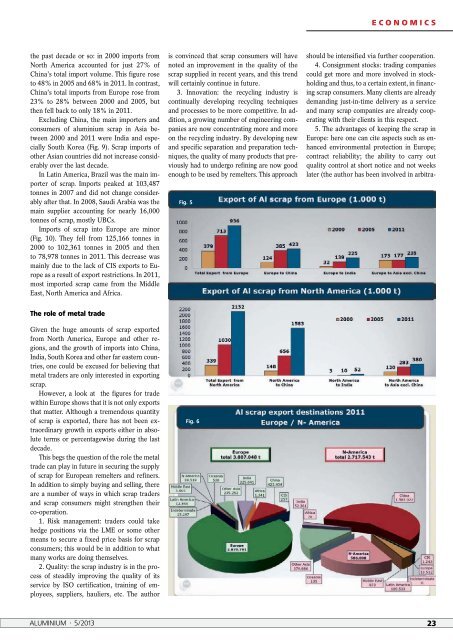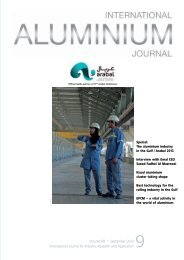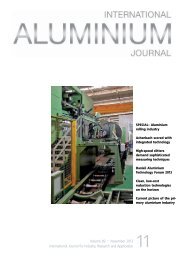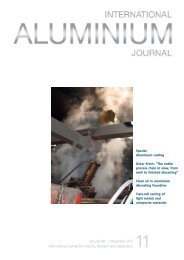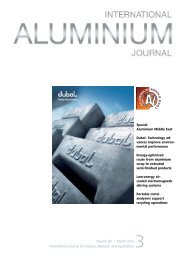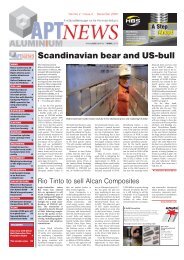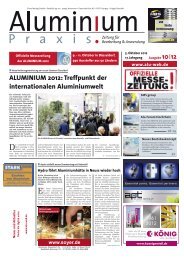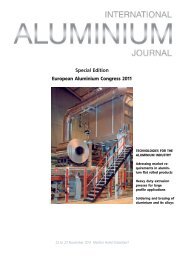SMS Siemag AG - Alu-web.de
SMS Siemag AG - Alu-web.de
SMS Siemag AG - Alu-web.de
Create successful ePaper yourself
Turn your PDF publications into a flip-book with our unique Google optimized e-Paper software.
E conoM ics<br />
the past <strong>de</strong>ca<strong>de</strong> or so: in 2000 imports from<br />
North America accounted for just 27% of<br />
China’s total import volume. This figure rose<br />
to 48% in 2005 and 68% in 2011. In contrast,<br />
China’s total imports from Europe rose from<br />
23% to 28% between 2000 and 2005, but<br />
then fell back to only 18% in 2011.<br />
Excluding China, the main importers and<br />
consumers of aluminium scrap in Asia between<br />
2000 and 2011 were India and especially<br />
South Korea (Fig. 9). Scrap imports of<br />
other Asian countries did not increase consi<strong>de</strong>rably<br />
over the last <strong>de</strong>ca<strong>de</strong>.<br />
In Latin America, Brazil was the main importer<br />
of scrap. Imports peaked at 103,487<br />
tonnes in 2007 and did not change consi<strong>de</strong>rably<br />
after that. In 2008, Saudi Arabia was the<br />
main supplier accounting for nearly 16,000<br />
tonnes of scrap, mostly UBCs.<br />
Imports of scrap into Europe are minor<br />
(Fig. 10). They fell from 125,166 tonnes in<br />
2000 to 102,361 tonnes in 2005 and then<br />
to 78,978 tonnes in 2011. This <strong>de</strong>crease was<br />
mainly due to the lack of CIS exports to Europe<br />
as a result of export restrictions. In 2011,<br />
most imported scrap came from the Middle<br />
East, North America and Africa.<br />
is convinced that scrap consumers will have<br />
noted an improvement in the quality of the<br />
scrap supplied in recent years, and this trend<br />
will certainly continue in future.<br />
3. Innovation: the recycling industry is<br />
continually <strong>de</strong>veloping recycling techniques<br />
and processes to be more competitive. In addition,<br />
a growing number of engineering companies<br />
are now concentrating more and more<br />
on the recycling industry. By <strong>de</strong>veloping new<br />
and specific separation and preparation techniques,<br />
the quality of many products that previously<br />
had to un<strong>de</strong>rgo refining are now good<br />
enough to be used by remelters. This approach<br />
Fig. 5<br />
should be intensified via further cooperation.<br />
4. Consignment stocks: trading companies<br />
could get more and more involved in stockholding<br />
and thus, to a certain extent, in financing<br />
scrap consumers. Many clients are already<br />
<strong>de</strong>manding just-in-time <strong>de</strong>livery as a service<br />
and many scrap companies are already cooperating<br />
with their clients in this respect.<br />
5. The advantages of keeping the scrap in<br />
Europe: here one can cite aspects such as enhanced<br />
environmental protection in Europe;<br />
contract reliability; the ability to carry out<br />
quality control at short notice and not weeks<br />
later (the author has been involved in arbitra-<br />
the role of metal tra<strong>de</strong><br />
Given the huge amounts of scrap exported<br />
from North America, Europe and other regions,<br />
and the growth of imports into China,<br />
India, South Korea and other far eastern countries,<br />
one could be excused for believing that<br />
metal tra<strong>de</strong>rs are only interested in exporting<br />
scrap.<br />
However, a look at the figures for tra<strong>de</strong><br />
within Europe shows that it is not only exports<br />
that matter. Although a tremendous quantity<br />
of scrap is exported, there has not been extraordinary<br />
growth in exports either in absolute<br />
terms or percentagewise during the last<br />
<strong>de</strong>ca<strong>de</strong>.<br />
This begs the question of the role the metal<br />
tra<strong>de</strong> can play in future in securing the supply<br />
of scrap for European remelters and refiners.<br />
In addition to simply buying and selling, there<br />
are a number of ways in which scrap tra<strong>de</strong>rs<br />
and scrap consumers might strengthen their<br />
co-operation.<br />
1. Risk management: tra<strong>de</strong>rs could take<br />
hedge positions via the LME or some other<br />
means to secure a fixed price basis for scrap<br />
consumers; this would be in addition to what<br />
many works are doing themselves.<br />
2. Quality: the scrap industry is in the process<br />
of steadily improving the quality of its<br />
service by ISO certification, training of employees,<br />
suppliers, hauliers, etc. The author<br />
Fig. 6<br />
ALUMINIUM · 5/2013 23


